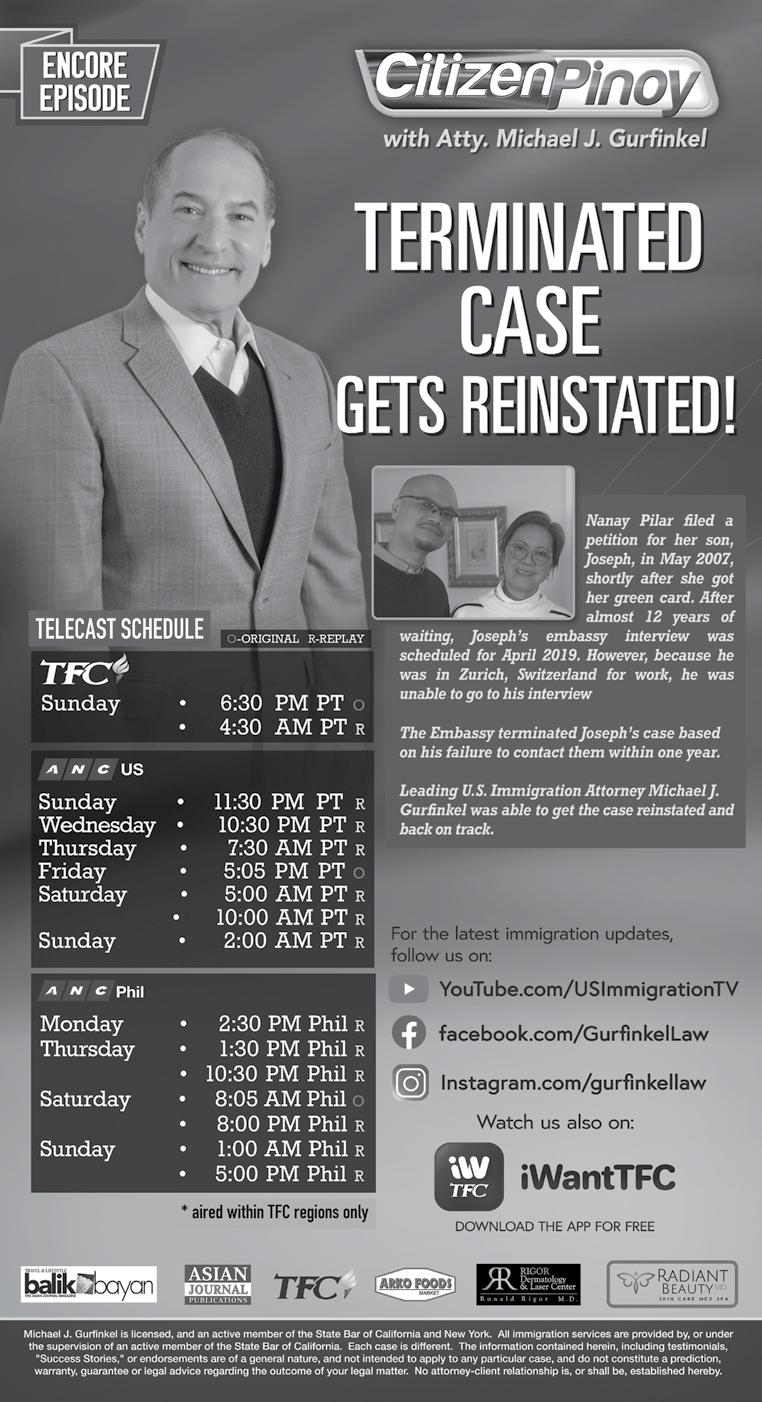
2 minute read
No Filipino hurt in Hawaii wildfires...
registration, notarization of legal documents and dual citizenship process.
The Philippine Coast Guard (PCG), in an advisory, said the "disaster has resulted in casualties, downed power and communication lines, and closure of certain roads."
Advertisement
The postponement was in line with the emergency proclamation issued by Hawaii acting Gov. Sylvia Luke on Wednesday,
August 9 that "discouraged nonessential air travel" to Maui, it added.
The PCG said Luke's directive would "allow for an effective emergency response to the wildfires currently affecting the island." The consulate said it will post an advisory on the new dates of the consular outreach mission to Maui once they are known.
The DFA in a statement posted on X (formerly Twitter) said: "Our embassies and consulates abroad remain steadfast in providing assistance to Filipino communities around the globe."
Filipinos overseas are not always able to go to the nearest embassy or consulate for services, the department said.
"Our embassies and consulates general abroad conduct outreaches in order to give necessary services in various parts of the world," it added. (Bernadette E. Tamayo/ ManilaTimes.net)
“This is an important first step in developing treatments for complex neurodegenerative diseases, but it’s just a first step,” said Ronald Petersen, director of the Mayo Clinic’s Alzheimer’s Disease Research Center in Rochester, Minnesota.
Unanswered questions abound as this new era of treatment begins for mild cognitive impairment
‘If you’re
Go and early-stage Alzheimer’s.
Will Leqembi’s primary benefit
— a slight slowing of decline in cognition and functioning — make a significant difference to patients and family members or will it be difficult to discern? Will its effects accelerate, decelerate, or flatten out over time?
Will demand for Leqembi (the brand name for lecanemab), a monoclonal antibody that requires infusions every two weeks, be robust or restrained? How many older adults in their 70s and 80s will be able and willing to travel to medical centers for infusions twice a month and have regular MRI scans and physician visits to monitor for potential side effects such as brain bleeds or swelling?
Even with Medicare coverage, how many people will be able to afford the suite of medical services required, including cognitive tests, infusions, doctors’ appointments, MRI scans, genetic tests, and spinal taps or PET scans to verify the presence of amyloid plaques, a hallmark of Alzheimer’s and a precondition for receiving this therapy?
Will primary care physicians start routinely screening older adults for mild cognitive impairment, something that doesn’t happen currently?
These questions aren’t surprising, given that these dementia treatments are opening uncharted territory. Here’s some of what people should know: Leqembi basics. Leqembi is very effective at removing amyloid plaques (a protein that clumps between neurons) from people’s brains. But it doesn’t reverse cognitive decline or prevent future deterioration.
In a briefing document, Eisai, the company that makes Leqembi, said clinical trials showed a 27% slower rate of decline for people taking the drug. But when raw scores on the cognitive scale used to measure results are considered (4.41 for the Leqembi group at the end of 18 months versus 4.86 for the placebo group), the rate of improvement was 9%, according to Lon Schneider, a professor





